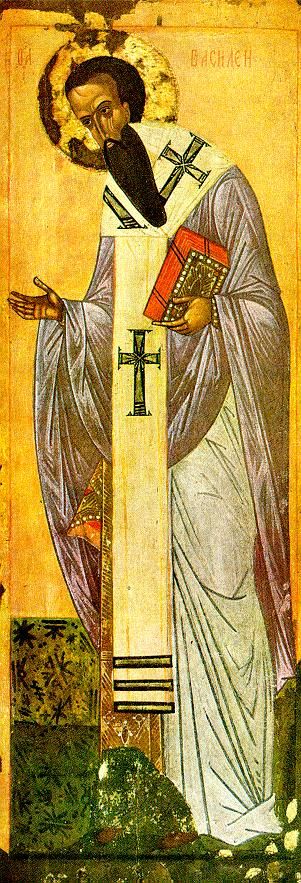Today, January 2, we celebrate the feast of Saint Basil the Great (329-379), Bishop of Caesarea, Church Father and Doctor of the Church. Saint Basil is remembered for his reformation of the Liturgy, fight against heresies, and defense of both the humanity and divinity of Jesus Christ. Truly “great,” we look to Saint Gregory’s faith, service, humility, and charity as we begin our new year. Below, an except from his monastic rule—still used by Eastern monks today—entitled, “The Spark of Divine Love.”
Love of God is not something that can be taught. We did not learn from someone else how to rejoice in light or want to live, or to love our parents or guardians. It is the same - perhaps even more so - with our love for God: it does not come by another’s teaching. As soon as the living creature (that is, man) comes to be, a power of reason is implanted in us like a seed, containing within it the ability and the need to love. When the school of God’s law admits this power of reason, it cultivates it diligently, skilfully nurtures it, and with God’s help brings it to perfection.
For this reason, as by God’s gift, I find you with the zeal necessary to attain this end, and you on your part help me with your prayers. I will try to fan into flame the spark of divine love that is hidden within you, as far as I am able through the power of the Holy Spirit.
First, let me say that we have already received from God the ability to fulfil all his commands. We have then no reason to resent them, as if something beyond our capacity were being asked of us. We have no reason either to be angry, as if we had to pay back more than we had received. When we use this ability in a right and fitting way, we lead a life of virtue and holiness. But if we misuse it, we fall into sin.
This is the definition of sin: the misuse of powers given us by God for doing good, a use contrary to God’s commands. On the other hand, the virtue that God asks of us is the use of the same powers based on a good conscience in accordance with God’s command.
Since this is so, we can say the same about love. Since we received a command to love God, we possess from the first moment of our existence an innate power and ability to love. The proof of this is not to be sought outside ourselves, but each one can learn this from himself and in himself. It is natural for us to want things that are good and pleasing to the eye, even though at first different things seem beautiful and good to different people. In the same way, we love what is related to us or near to us, though we have not been taught to do so, and we spontaneously feel well disposed to our benefactors.
What, I ask, is more wonderful than the beauty of God? What thought is more pleasing and wonderful than God’s majesty? What desire is as urgent and overpowering as the desire implanted by God in a soul that is completely purified of sin and cries out in its love: I am wounded by love? The radiance of divine beauty is altogether beyond the power of words to describe.
Why pray the Rosary every day for a year?
Each time the Blessed Virgin has appeared-- whether it be to Saint Bernadette Soubirous at Lourdes; to Lucia, Jacinta, and Francisco at Fatima; or to Mariette Beco at Banneux-- she has asserted the importance, saving grace, and power of praying the Holy Rosary on a daily basis. Based upon her words, the Rosary is penance and conversion for sinners, a pathway to peace, an end to war, and a powerful act of faith in Jesus Christ. Pope Paul VI presented the Rosary as a powerful means to reach Christ "not merely with Mary but indeed, insofar as this is possible to us, in the same way as Mary, who is certainly the one who thought about Him more than anyone else has ever done."
To show us how this is done, perhaps no one has been more eloquent than the great Cardinal Newman, who wrote: "The great power of the Rosary consists in the fact that it translates the Creed into Prayer. Of course, the Creed is already in a certain sense a prayer and a great act of homage towards God, but the Rosary brings us to meditate again on the great truth of His life and death, and brings this truth close to our hearts. Even Christians, although they know God, usually fear rather than love Him. The strength of the Rosary lies in the particular manner in which it considers these mysteries, since all our thinking about Christ is intertwined with the thought of His Mother, in the relations between Mother and Son; the Holy Family is presented to us, the home in which God lived His infinite love."
As Mary said at Fatima, "Jesus wants to use you to make Me known and loved. He wishes to establish the devotion to My Immaculate Heart throughout the world. I promise salvation to whoever embraces it; these souls will be dear to God, like flowers put by Me to adorn his throne."

Subscribe to:
Post Comments (Atom)











0 comments:
Post a Comment
Thanks for leaving a comment. If you wish to submit a prayer request, however, please do so above, using the "Contact" tab.